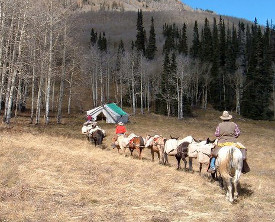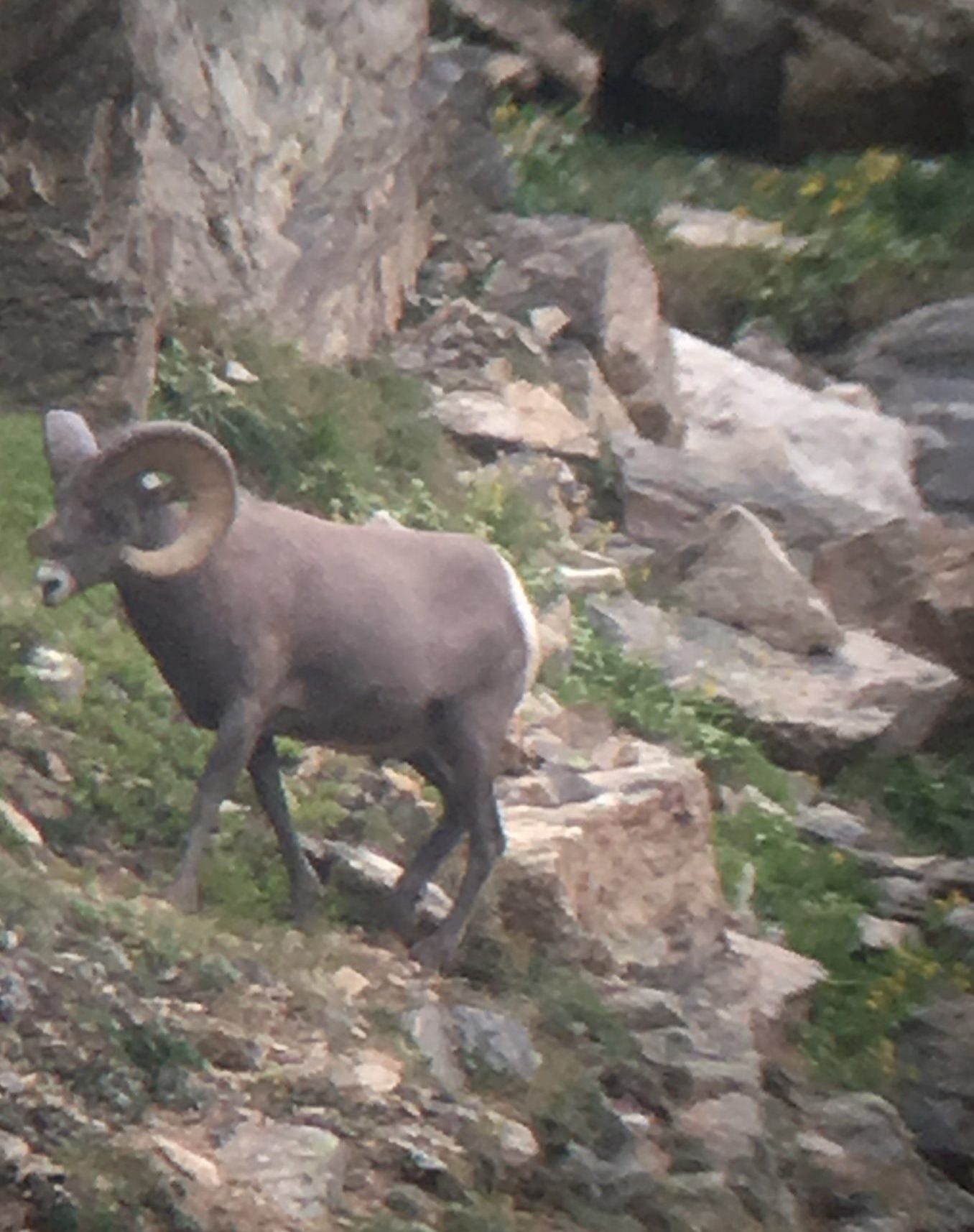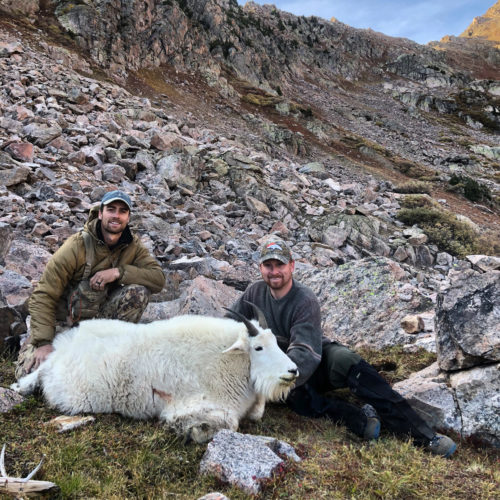No ATV’s, no hoards of road hunters, clean mountain air and bulls bugling across a high alpine meadow. Wilderness hunts are truly hunts of a lifetime. However, these hunts are a different beast so you have to understand what you are getting into, what your expectations should be, and how to choose the right outfitter to help you enjoy the experience.
You are looking for a pristine experience; few other hunters around, no vehicles zipping around the mountains, and most importantly game acting the way undisturbed animals act. There are much easier ways to hunt elk than in the true wilderness, but there isn’t a more fulfilling way.
[image_frame style=”framed_shadow” align=”center” title=”Flat Tops Wilderness Guides Pack String”]http://www.flattopswildernessguides.com/wp-content/uploads/2014/03/45-e1395766931123.jpg[/image_frame]
What variable defines this type of hunt? Accessibility, plain and simple. In my area, our wilderness hunts are 95% done on actual designated wilderness. One camp out of 13 is not in wilderness. By law, no vehicles (including bicycles or even game carts) are allowed into the 240,000 acre area. That designation isn’t what matters though. What matters, is that the area you are hunting has difficult access. This almost always means the primary mode of travel (by all hunters, not just your outfitter) is horse and mule. Some non-wilderness National Forest is road-less and only assessable by horse. Do not discount these areas. By the same token, huge tracts of designated wilderness are actually assessable by vehicle and can get pressured (e.g. a road is on non-designated land that borders your hunt area).
The telling question to ask you outfitter is “How do most the outfitter hunters and public DIY hunters get into the area?”
[image_frame style=”framed_shadow” align=”center” title=”Sweetwater CO outfitter camp”]http://www.flattopswildernessguides.com/wp-content/uploads/2014/03/122.jpg[/image_frame]
The public and outfitters in our area hunt almost only by horse and mule. Our base camp lodge and pack station is located on private land at a horse/foot only trailhead into the South side of the Flat Tops Wilderness. This public access travels through a mile of private property before reaching the wilderness. There are always a handful of enterprising backpack hunters, but the access and huge open ground in our wilderness area limits their ability to consistently get into game. Everybody should go on a DIY backpack Wilderness hunt as I mention here, but our area is difficult for that type of hunt. Our closest camps are 1.5-2 hour horse rides from the trailhead with a minimum of 1,900 ft. elevation gain. That is roughly 190 flights of stairs. Starting at 9,000 feet elevation, that is a hell of a workout for a hiker. Add in 40-60lbs of hunting gear per person and the journey on foot is solely suitable for masochists. Our farthest camps are a 4-5 hours horse ride with a 3,400+ ft. elevation gain. People going in there on foot are putting themselves into serious danger and are not having fun.
A note on expectations about the privacy of your hunting area:
Be wary of an outfitter that tells you that the area of wilderness you will be hunting is full of elk and not hunted by the public. Particularly in Colorado, anywhere with a decent elk population will have its fair share of public hunters. Good outfitters do their best to use the advantage of seasoned mountain stock (horses and mules), local knowledge and professional level gear to get you away from other hunters. However, there is no guarantee you won’t see public hunters. Remember, keeping you safe is first priority. Our default second priority is getting you into bulls. Avoiding the public is third. If your outfitter does know other hunters are in the area, they should instruct you on how to use the hunting pressure to your advantage in the geography of your camp.
As a packed in hunter, with the added amenities a pack string can haul in, you have a big advantage over DIY hunters. You have the opportunity to be well rested and well fed. Through my 20’s I backpack hunted a ton. Even if you are in peak physical fitness, hauling 40-50lbs of gear around and living off freeze dried mush does adversely affect your ability to hunt hard.
I’ll of that being said, personally, I really don’t enjoy encountering other hunters while hunting. Hence, I understand client’s frustrations when it does periodically occur. If it is really important to your party that you don’t see other hunters, tell your outfitter when booking. You may be sacrificing some hunting opportunities, but it is your trip not the outfitter’s trip. Outfitters with multiple camps should be able to accommodate this request to a high degree of certainty.
Another underutilized way to avoid seeing other hunters is to apply for 1st season rifle hunts or hunt archery. Our unit is almost 100% draw for 1st season, but few hunters take advantage of that opportunity. We leave some of our best camps open every year 1st season, because people refuse to deal with the draw.
[image_frame style=”framed_shadow” title=”Flat Tops Hunting Rainbow” align=”center”]http://www.flattopswildernessguides.com/wp-content/uploads/2014/03/108-e1395767015975.jpg[/image_frame]
A note on physical fitness, horseback riding and wilderness skills:
As outfitters we provided you with a lot of services that will help you have a great hunt. However, part of the fun of the wilderness hunt is that at some point you will be out of your comfort zone. Even on our full service hunts, there will be at least a couple times during your hunt that the adrenaline gets pumping. You’re at 11K feet in rough terrain, chasing a 900lb mountain beast! Having some basic skills and prepping for you hunt will help you overcome these moments and continue to hunt hard.
The key things you should focus on:
- Cardio vascular endurance – Get in the best shape of your life. Being able to cover ground, means being able to hunt elk like they are built to be hunted.
- Horseback riding – Particularly in full service camps, where we are riding every day, don’t underestimate how tough riding can be on an untrained body. Even getting on a horse for an hour a couple times in the weeks before your hunt, will help your body adjust.
- Wilderness skills – Know how to start a fire in cold, wet, rainy, and snowy conditions. Know basic navigation skills. Things can happen in the wilderness and these skills will save your life.




